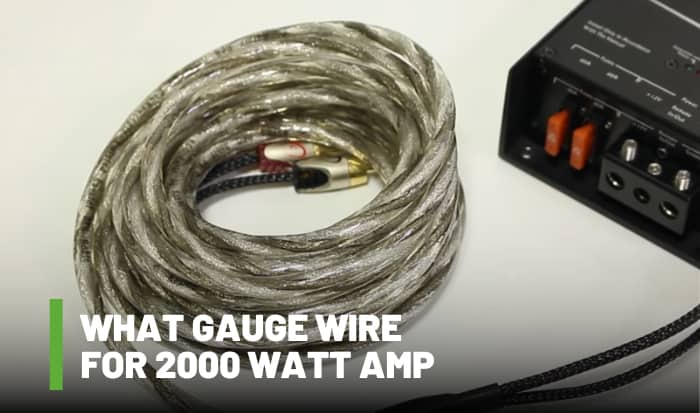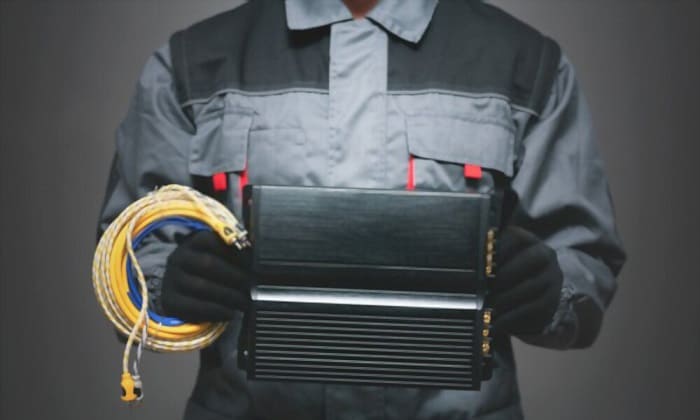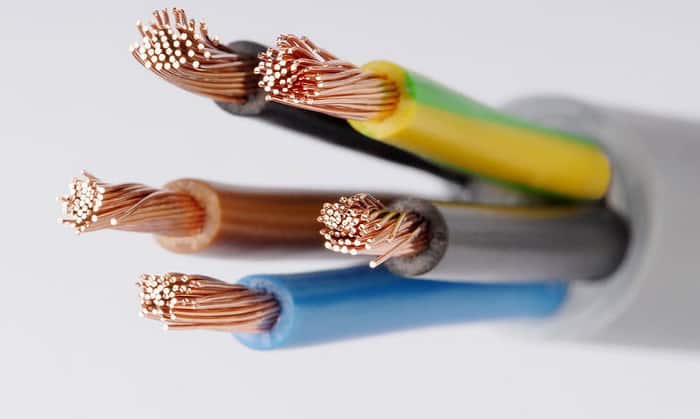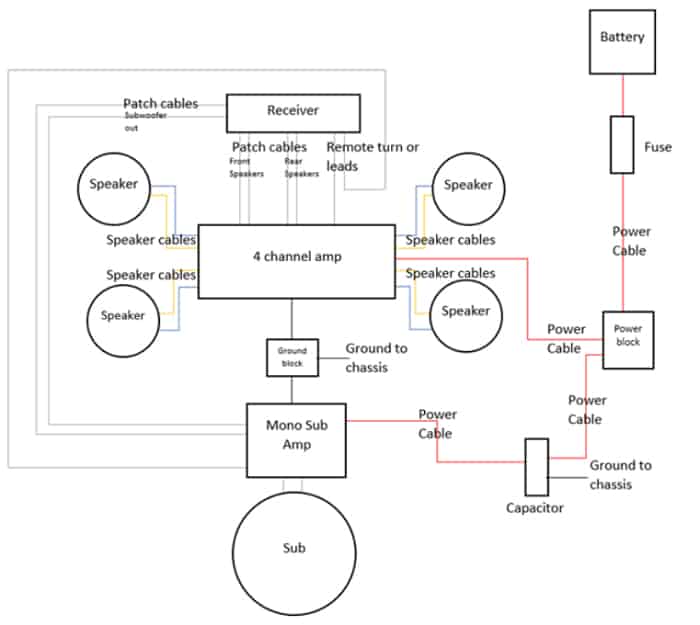Amplifiers are one of the common upgrades for vehicles, and before installing 2000 watt car amplifiers, users will need to plan for their electrical needs to ensure optimal performance. One thing to consider is the wires used.
To know what gauge wire for 2000 watt amp is necessary, we need to know the amplifier’s efficiency and its distance from the battery. The cable can range from 6-gauge for short lengths up to 2/0-gauge for 22 feet, depending on the amp’s classification.
Table of Contents
Current Draw of 2000 Watt Car Amplifiers
- The first thing we need to know is the current draw of the car amp.
We can derive this from the definition of electrical power:
\begin{equation}
\text{Power (watts)} = \text{Voltage (volts)} \times \text{Current (amperes)}
\end{equation}
If we re-arrange this, we get:
\begin{equation}
\text{Current (amperes)} = \frac{\text{Power (watts)}}{\text{Voltage (volts)}}
\end{equation}
Normally, the power of car amplifiers is expressed in root mean square, or more commonly known as the RMS wattage. Also, this measurement might be expressed per channel, so get the total RMS wattage for all channels before computing the current draw.
Likewise, the amplifier will draw more current when the car battery’s voltage is lower, so we may set our voltage at around 12.8 volts to get the maximum current that the car amplifier might need. Thus, we can re-write our expression as:
\begin{equation}
\text{Current (amperes)} = \frac{\text{RMS wattage (watts)}}{12.8 \text{ volts}}
\end{equation}
- The next thing we have to know is the efficiency of the car amplifier.
Car amplifiers are commonly categorized as Class AB or Class D. Class AB amps have efficiencies of around 58%-65%, while Class D amps have higher efficiencies of around 69%-80%.
Thus, we rearrange our formula to include the efficiency of the car amp to get:
\begin{equation}
\text{Current (amperes)} = \frac{\text{RMS wattage (watts)}}{12.8 \text{ volts} \times \text{Efficiency}}
\end{equation}
For example, if we look at the Orion XTR1000.4 available on Amazon.com or check its specifications sheet, we’ll see that its RMS wattage is around 2000 watts with a 60% efficiency. So, we can estimate its total current draw:
\begin{align*}
\text{Current (amperes)} &= \frac{\text{RMS wattage (watts)}}{12.8 \text{ volts} \times \text{Efficiency}}\\
&= \frac{2000 \text{ watts}}{12.8 \text{ volts} \times 0.60}\\
&= 260.4 \text{ amperes}
\end{align*}
Using this relationship, we can determine the wire gauge based on the amperage of the amplifier.
Also, we may generally expect larger current draws for 3000 watt amp units, and lower draws for weaker devices like a 1000 watt amp or a 1500 watt amp.
1. Types of Gauges
The second thing we need to know is the gauge of the wire, expressed in American Wire Gauge based on thickness. The lower the number, the thicker the wire.
Wires may be classified from 0000 gauge (4/0 gauge) with a diameter of 0.46 inches (almost half an inch) down to 40 gauge with a very thin diameter of 0.0031 inches.
Thicker wires, thus lower gauge numbers, have greater current carrying capacities, since they allow more electrons per unit length. Thus, if we have higher powered devices like a 2500 watt amp, they will need thicker wires, while a small 200 watt amp may need thinner wires.
2. Length of wire
The last thing we need to know is the length of wire to be used for amplifier connections. Any conductor has inherent resistance within them. This resistance is caused by electrical charges hitting atoms in the wire.
The longer the wire, the greater the resistance will be. This produces a voltage drop at the part of the amplifier and may cause a lack of current flowing through the amp. The lack of current makes the car amp operate at suboptimal conditions.
What is the Right Gauge for My Amplifier?
Choosing between 4 gauge vs 8 gauge wires or other cable sizes should be easy if you consider voltage drops and amplifier ratings. Here is the estimated wire gauge based on the current needed by the car amplifier and length of wire:
| Maximum Current (amperes) | Wire gauge in AWG based on maximum length of wire | ||||||
| 4 feet | 7 feet | 10 feet | 13 feet | 16 feet | 19 feet | 22 feet | |
| 20 | 12 | 12 | 12 | 12 | 10 | 10 | 10 |
| 35 | 12 | 10 | 10 | 10 | 10 | 8 | 8 |
| 50 | 10 | 10 | 10 | 8 | 8 | 8 | 6 or 4 |
| 65 | 10 | 10 | 8 | 8 | 6 or 4 | 6 or 4 | 4 |
| 85 | 10 | 8 | 8 | 6 or 4 | 4 | 4 | 4 |
| 105 | 8 | 8 | 6 or 4 | 4 | 4 | 4 | 4 |
| 125 | 8 | 8 | 6 or 4 | 4 | 4 | 4 | 2 |
| 150 | 8 | 6 or 4 | 4 | 4 | 2 | 2 | 2 |
| 200 | 6 or 4 | 4 | 4 | 2 | 2 | 1/0 | 1/0 |
| 250 | 4 | 4 | 2 | 2 | 1/0 | 1/0 | 1/0 |
| 300 | 4 | 2 | 2 | 1/0 | 1/0 | 1/0 | 2/0 |
In our earlier example, the Orion XTR1000.4 (the model with 2000 watts = amps of 60% efficiency) draws around 260 amperes. If the distance from the battery to the amplifier is around 7 feet plus some 3 feet for allowance, making a total length of 10 feet, then 2-gauge wire should be good.
If we summarize our findings from the computation of current for 2000 watt car amps and compare it to the table above, we would find:
| Car amp | Current draw (amperes) | Wire gauge minimum (up to 4 feet) (AWG) | Wire gauge maximum (up to 22 feet) (AWG) |
| Class AB (58% efficiency) | 269 | 4 | 2/0 |
| Class AB (65% efficiency) | 240 | 4 | 1/0 |
| Class D (69% efficiency) | 226 | 4 | 1/0 |
| Class D (80% efficiency) | 195 | 6 or 4 | 1/0 |
Thus, 6 gauge and 4 gauge wire handle 2000 watts at short distances, while 2/0 gauge wire for amp units will do 22 feet away from the battery.
Also, the speaker wires should be considered to deliver the signal from the car amp properly. Main speaker units often have short cables and are fine with 16 gauge, while subwoofers and longer runs might need 12 gauge.
Basic Amplifier Diagram
A 2000 watt amp wiring kit is available if you don’t want to buy each wire individually. These bundles include a certain gauge power wire for amp units, ground wires, speaker wires, and more. Here is a basic example of how to wire a 4 channel amplifier with a subwoofer.
Conclusion
Is 8 gauge wire enough for amp units with power ratings of 2000 watts? Probably not, since we saw what gauge wire for 2000 watt amp should be (at least 6 gauge for up to 4 feet). Using the right wire gauge may lead to a successful installation and will allow your car amplifier to operate successfully.

I am Edwin Jones, in charge of designing content for Galvinpower. I aspire to use my experiences in marketing to create reliable and necessary information to help our readers. It has been fun to work with Andrew and apply his incredible knowledge to our content.





